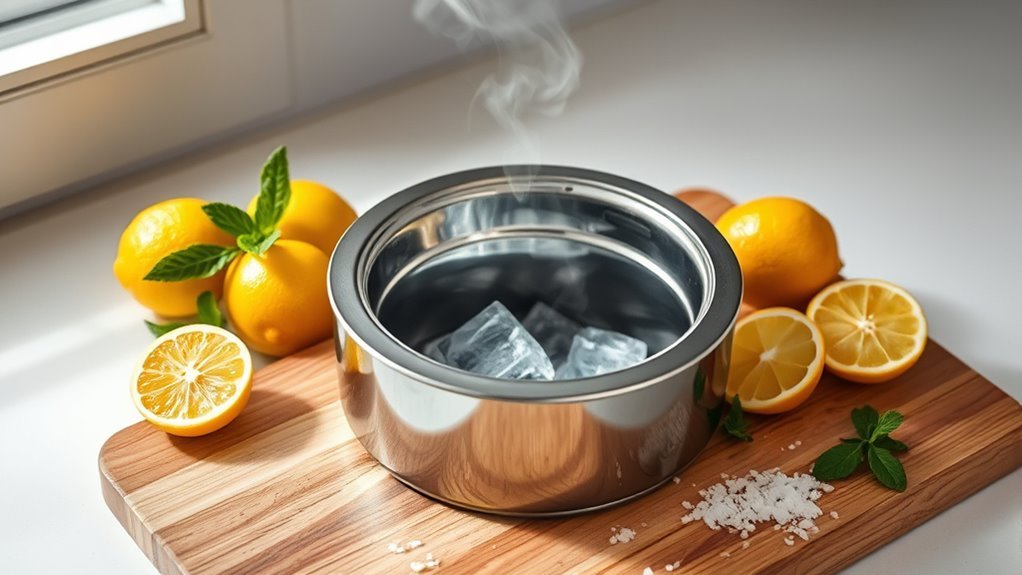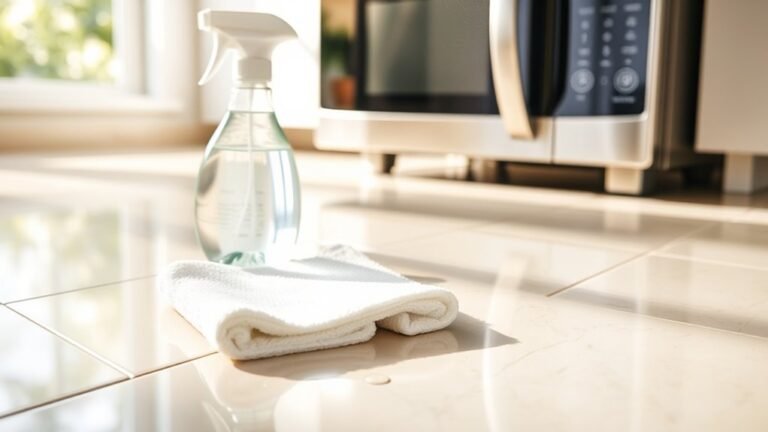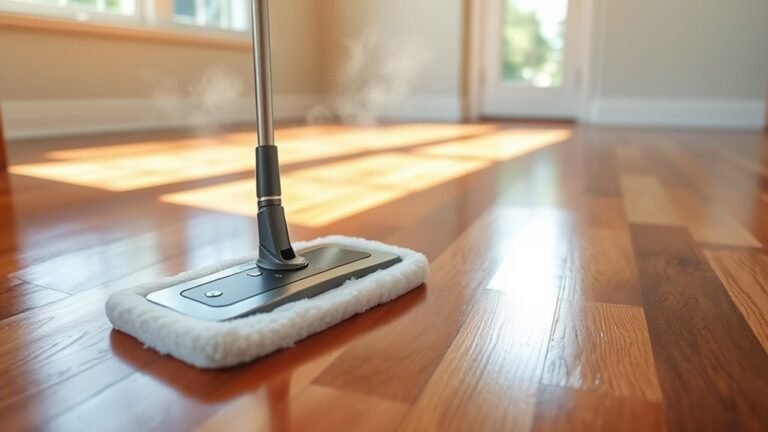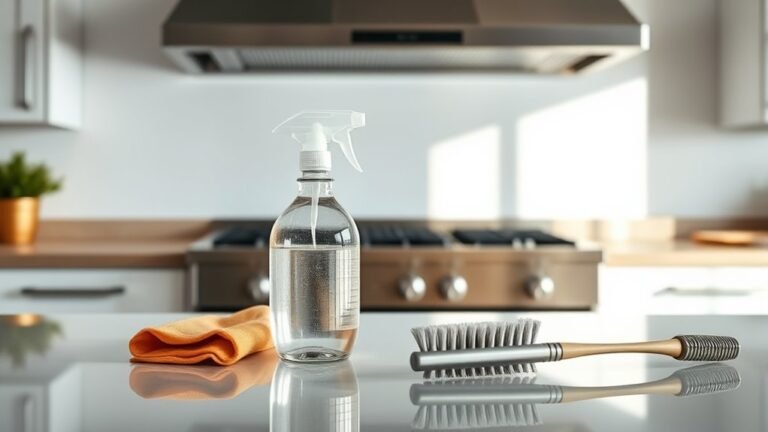How to Maintain a Clean and Odor-Free Garbage Disposal
To keep your garbage disposal clean and odor-free, run cold water while using it to flush away debris. Regularly grind citrus peels and ice cubes to break down buildup and sharpen blades. Use baking soda and vinegar occasionally to neutralize smells. Avoid putting fibrous or greasy foods in to prevent clogs and damage. With these simple habits, you’ll keep your kitchen fresh and your disposal working smoothly. There’s more handy advice to help you maintain it perfectly.
Understanding Common Causes of Garbage Disposal Odors

Although your garbage disposal might seem like a simple appliance, it can develop unpleasant odors if food particles get trapped inside. When scraps of food get stuck in the small crevices or on the blades, they begin to decompose, causing that foul smell. Grease buildup is another common culprit, as it coats the disposal’s interior and traps odor-causing bacteria. You might also find that not running enough water during use leaves residue behind, increasing the chance for odors. Understanding these common causes is key to effective odor prevention. By knowing how food waste and grease contribute to smells, you’re better equipped to keep your garbage disposal fresh and free from unwanted scents, giving you the freedom to enjoy a cleaner kitchen environment.
Regular Cleaning Techniques for Garbage Disposals
Keeping your garbage disposal clean is essential to prevent odors and maintain its efficiency. To stay ahead, follow simple disposal maintenance tips like running cold water while using the disposal and grinding small citrus peels occasionally to clear buildup. Make it a habit to clean your disposal weekly or at least biweekly, as cleaning frequency recommendations suggest, to avoid grime and food residue accumulation. You can easily clean it by turning it off, removing any visible debris, and scrubbing the rubber splash guard with a small brush and soapy water. Then, run cold water and turn on the disposal for a few seconds to flush out remaining particles. Consistently applying these regular cleaning techniques will keep your disposal fresh and functioning smoothly, giving you freedom from unpleasant odors and costly repairs.
Using Natural Deodorizers to Eliminate Smells

You can keep your garbage disposal smelling fresh by using natural deodorizers like baking soda, which neutralizes odors effectively. Citrus peels not only add a pleasant scent but also help break down buildup inside the disposal. Plus, vinegar’s cleaning properties make it a great choice for eliminating stubborn smells without harsh chemicals.
Baking Soda Benefits
A simple spoonful of baking soda can work wonders in neutralizing odors in your garbage disposal. Baking soda acts as a powerful odor neutralizer, absorbing unpleasant smells without masking them with artificial scents. You just sprinkle it directly into the disposal, then run some water to let it do its magic. This natural deodorizer is safe, eco-friendly, and inexpensive—perfect if you want to avoid harsh chemicals. Using baking soda regularly keeps your disposal fresh and your kitchen smelling clean, giving you freedom from stubborn odors. Plus, it’s easy to store and always ready when you need it. So, embrace baking soda as your go-to odor neutralizer and enjoy a fresher, cleaner garbage disposal without any hassle.
Citrus Peel Uses
Baking soda is great for neutralizing odors, but combining it with citrus peels can take your garbage disposal’s freshness to the next level. Citrus benefits go beyond just a pleasant scent; their natural acids break down buildup and leave your disposal cleaner and smelling amazing. After running baking soda through, toss in lemon, lime, or orange peels while running cold water. This simple trick not only deodorizes but also helps maintain your disposal’s efficiency. You can even experiment with different citrus recipes by mixing peels—like grapefruit with lemon—to customize the aroma. Using natural deodorizers like citrus peels gives you control over your kitchen’s environment without harsh chemicals, keeping your space fresh and free to enjoy without worry.
Vinegar Cleaning Effects
While citrus peels tackle odors with their natural acids, vinegar offers a powerful, natural alternative for deodorizing and cleaning your garbage disposal. You’ll appreciate the vinegar benefits, as it not only neutralizes smells but also breaks down buildup, keeping your disposal fresh and efficient. Here’s how to use vinegar solutions effectively:
- Pour half a cup of white vinegar into the disposal.
- Let it sit for 10-15 minutes to dissolve grime and odors.
- Flush with hot water while running the disposal to clear loosened debris.
- Repeat weekly to maintain a clean and odor-free system.
Using vinegar solutions gives you a chemical-free way to enjoy a fresh kitchen, empowering you to keep your space clean with freedom and ease.
Safe Foods to Use for Disposal Cleaning

Several safe foods can help you clean your garbage disposal effectively without causing damage. Using safe disposal foods like lemon wedges, ice cubes, and baking soda offers excellent cleaning benefits. Lemon wedges not only freshen odors but also help break down buildup. Ice cubes sharpen blades and dislodge debris, keeping your disposal running smoothly. Baking soda neutralizes odors and loosens grime when combined with water or vinegar, making it a simple yet powerful cleaner. By choosing these foods, you maintain your disposal’s efficiency and avoid harsh chemicals. Embracing these natural options gives you freedom from worrying about damage or toxic residues. So, next time your disposal needs a quick refresh, reach for these safe foods—they’re effective, eco-friendly, and easy to use.
Avoiding Items That Damage the Garbage Disposal
Using safe foods like lemon wedges and ice cubes helps keep your garbage disposal clean and efficient, but it’s just as important to know what not to put down there. Avoiding damaging items extends your disposal’s life and keeps your kitchen running freely. Here are four things you should steer clear of:
- Sharp objects — Knives, forks, or metal pieces can seriously damage the blades.
- Fibrous materials — Celery, corn husks, and onion skins wrap around the blades and cause jams.
- Grease and oil — These solidify and clog pipes, restricting flow.
- Starchy foods — Potato peels and pasta expand, creating blockages.
How to Flush and Rinse Your Garbage Disposal Properly
To keep your garbage disposal running smoothly, always flush it with cold water while it’s grinding. This helps solidify any grease and guarantees waste moves through the pipes easily. After using it, give the disposal a quick rinse with cold water to wash away leftover debris and prevent buildup.
Cold Water Importance
One key step in maintaining your garbage disposal is always running cold water while it’s operating. Cold water usage offers several cold water benefits that help keep your disposal clean and functional. Here’s why you should stick to cold water:
- It solidifies fats and oils, preventing them from clogging your pipes.
- Cold water helps the disposal blades work efficiently by keeping food particles firm.
- It flushes debris down the drain, reducing buildup and odors.
- Cold water usage prolongs the life of your disposal by minimizing wear and tear.
Disposal Flushing Technique
Properly flushing and rinsing your garbage disposal is essential for keeping it clear of debris and preventing odors. To do this, start by running cold water into the sink before turning on the disposal. This solidifies any grease or oils, helping to push food particles through the system. Let the water run steadily while the disposal grinds, then continue flushing for about 15 seconds after turning it off. This simple disposal maintenance step guarantees no residue remains to cause clogs or bad smells. By making this flushing technique a habit, you’ll enjoy a freer, cleaner kitchen environment without unwanted odors. Staying consistent with this practice is key to odor prevention and prolongs the life of your garbage disposal.
Post-Use Rinsing Tips
Keeping your garbage disposal clean doesn’t stop with flushing during use; rinsing it thoroughly afterward helps remove leftover particles that can cause buildup and odors. Proper post use rinsing is key to effective disposal maintenance and keeping your kitchen fresh.
Here’s how to rinse your disposal right:
- Run cold water for at least 15 seconds after grinding to flush debris.
- Keep the water running while the disposal is off to clear residual bits.
- Occasionally, use a mild detergent or baking soda with water to neutralize odors.
- Finish by running a strong stream of cold water for another 15 seconds to wash everything down the drain.
Following these simple steps guarantees your disposal stays clean, odor-free, and ready to use whenever you need it.
DIY Solutions for Stubborn Odors
Several simple DIY methods can help you tackle stubborn odors in your garbage disposal without harsh chemicals. You don’t need expensive products when you can create effective diy odor neutralizers right at home. For example, mixing baking soda and vinegar creates a fizzy homemade cleaning solution that breaks down grime and neutralizes smells. Pour this mixture down the disposal, let it sit for 10-15 minutes, then rinse with hot water to clear away residue. Another option is using a few drops of essential oils like lemon or tea tree mixed with water to freshen the disposal naturally. These approaches let you maintain control over what goes into your system while keeping your kitchen fresh and odor-free without relying on commercial chemicals.
The Role of Ice Cubes and Citrus in Maintenance
You can use ice cubes to help clean your garbage disposal by sharpening the blades and knocking off debris. Citrus fruits, like lemons or limes, are great for neutralizing odors and leaving a fresh scent. Combining both gives you a simple, effective way to keep your disposal clean and smelling good.
Ice Cubes for Cleaning
Two simple ingredients—ice cubes and citrus—can work wonders in maintaining your garbage disposal. Focusing on ice cubes, their benefits go beyond just chilling drinks; they’re a powerful cleaning tool. Using the right ice cube techniques can help you keep your disposal sharp and free of buildup.
Here’s how to use ice cubes effectively:
- Freeze water in small cubes to harden debris for easier grinding.
- Drop a handful into the disposal and run cold water while turning it on.
- The ice scrapes off grime and sharpens the blades as it tumbles.
- Repeat regularly to prevent residue buildup and maintain peak performance.
Incorporating ice cubes into your routine gives you freedom from clogs and foul smells.
Citrus for Odor Control
Although ice cubes help keep your garbage disposal clean and sharp, citrus plays an essential role in controlling odors. When you toss in citrus peels—like lemon, lime, or orange—you release fresh citrus scents that naturally neutralize unpleasant smells. These citrus benefits don’t just mask odors; they break down residue that causes bad smells, leaving your disposal smelling clean and fresh. You’ll appreciate how simple it is to maintain a free-flowing, odor-free disposal with this natural method. Just run cold water, feed in the peels, and let the citrus do its work. It’s an easy, eco-friendly way to keep your kitchen smelling great without relying on harsh chemicals. Embrace this small habit—you’ll enjoy a fresher kitchen and the freedom from lingering odors.
Combined Benefits Explained
While ice cubes and citrus peels each serve distinct purposes, combining their uses offers a more thorough way to maintain your garbage disposal. This approach not only cleans but also freshens, giving you freedom from unpleasant smells and buildup. Here’s why mixing these methods is smart for garbage disposal maintenance and odor prevention:
- Ice cubes sharpen blades by knocking off debris and hardening residue.
- Citrus peels release natural oils that dissolve grime and neutralize odors.
- The cold from ice tightens components, reducing wear and tear.
- Citrus’s fresh scent leaves your kitchen smelling clean without harsh chemicals.
When to Use Commercial Garbage Disposal Cleaners
If you notice persistent odors or buildup that regular cleaning methods can’t handle, it might be time to use a commercial garbage disposal cleaner. These commercial products are designed to tackle tough grime and maintain your disposal’s efficiency without you needing to dismantle anything. Using them sparingly as part of your disposal maintenance routine can keep your unit fresh and functional.
| Cleaner Type | Best For | Frequency of Use |
|---|---|---|
| Enzymatic cleaners | Organic buildup removal | Monthly |
| Citrus-based | Odor elimination | Bi-weekly |
| Abrasive powders | Tough grime and stains | As needed |
Choose a cleaner that fits your needs, and enjoy the freedom of a clean, odor-free disposal with minimal effort.
Tips for Preventing Future Build-Up and Odors
To keep your garbage disposal running smoothly and smelling fresh, it’s important to adopt habits that prevent buildup and odors before they start. Taking preventive measures guarantees long term maintenance, saving you from costly repairs and unpleasant smells.
- Run cold water during and after use to flush out debris.
- Avoid putting fibrous, starchy, or greasy waste that clogs and attracts bacteria.
- Regularly grind small citrus peels to naturally deodorize and clean the blades.
- Perform monthly deep cleans with ice cubes and coarse salt to dislodge stuck particles.
Frequently Asked Questions
Can Garbage Disposals Be Repaired if They Emit Unusual Noises?
If your garbage disposal’s making unusual noises, you can usually fix it with the right repair techniques. First, try noise troubleshooting by turning off the power and checking for stuck debris or loose parts. Sometimes, simply tightening screws or removing jams does the trick. If that doesn’t work, you might need a professional. You don’t have to be stuck with the noise—you’ve got options to regain control and freedom in your kitchen.
How Often Should the Garbage Disposal’s Splash Guard Be Replaced?
Oh, your splash guard isn’t immortal—shocking, right? Made from rubber or silicone, these brave little defenders face constant wear and tear. You should replace your splash guard every 6 to 12 months, depending on usage and materials. Don’t let a worn-out guard cramp your freedom; a fresh one keeps things tidy and odor-free. Think of it as a small price for your liberation from kitchen chaos and unpleasant smells!
Is It Safe to Run a Garbage Disposal With the Water Off?
You shouldn’t run your garbage disposal without the water supply on. Water helps flush food particles through the pipes, preventing clogs and ensuring disposal safety. Without water, debris can get stuck, causing jams or damage. So, if you want to keep your freedom from costly repairs, always turn the water on before you start grinding. It’s a simple step that protects your disposal and keeps everything running smoothly.
What Are the Signs That a Garbage Disposal Needs Professional Servicing?
When your garbage disposal starts acting up, it’s a sign you can’t just sweep it under the rug. If you notice a foul smell lingering or slow drainage that won’t quit, it’s time to call in a pro. You don’t want to be chained down by constant issues—getting expert help frees you from hassle and keeps your kitchen running smoothly. Don’t wait until it’s too late!
Can Garbage Disposals Handle Small Bones or Shells Without Damage?
You might think small bones or shells are fine for bone disposal or shell grinding, but it’s best to avoid putting them in your garbage disposal. These tough materials can dull blades or cause jams, limiting your freedom from repairs. Instead, toss bones and shells in the trash or compost. Keeping your disposal free from hard debris lets you enjoy hassle-free use without worrying about damage or costly fixes.






